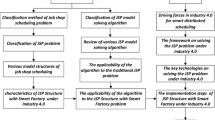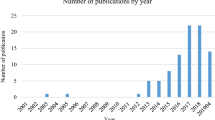Abstract
This study presents a novel bid construction scheme for an auction-based fully-distributed manufacturing system. The scheme is applied to the planning and control of manufacturing activities. A set of independent machining resources in the system, each with several ongoing set-up dependent jobs, compete for an upcoming job. The manner in which a resource constructs a bid determines job allocation and resource utilization and, consequently, job flow times. Resources that employ simple heuristic methods (e.g., based on a first-come-first-served scheme) to construct bids, often neglecting setup considerations, limit their applicability and performance quality. Here, the bid construction problem of a resource is formulated as a setup-sequencing (SS) problem. The optimal sequencing theory is then applied to develop a dynamic programming (DP)-based bid construction algorithm. The proposed algorithm has a computational complexity lower than that of the best-known algorithm for the SS problem. Additionally, parallel and distributed computing technology is utilized to model and implement this auction-based manufacturing control system in order to gain further insights into the effectiveness of the proposed DP-based bid construction scheme. Experimental results demonstrate that the proposed bid construction scheme performs well, and its contribution becomes obvious in the case of larger setup times and lot sizes.
Similar content being viewed by others
References
Dilts DM, Boyd NP, Whorms HH (1991) The evolution of control architectures for automated manufacturing systems. J Manuf Syst 10(1):79–93
Buzacott JA (1995) A perspective on new paradigms in manufacturing. J Manuf Syst 14(2):118–125
Bartos OJ (1974) Process and outcome of negotiations. Columbia University Press, New York
Lander SE, Staley SM, Corrkill DD (1995) Designing integrated engineering environments: blackboard-based integration of design and analysis tools. In: Proceedings of the International Joint Conference on Artificial Intelligence
Lin GY, Solberg JJ (1992) Integrated shop floor control using autonomous agents. IIE Trans 24(3):57–71
Veeramani D, Wang K-J (1997) Performance analysis of auction based distributed shop floor control schemes from the perspective of the communication system. Int J Flex Manuf Syst 9:121–143
Davis R, Smith RG (1983) Negotiation as a metaphor for distributed problem solving. Artif Intell 20:63–109
Monma CL, Potts CN (1989) On the complexity of scheduling with batch setup times. Oper Res 37(5):798–804
Duenyas I, Oyen MP (1994) Heuristic scheduling of parallel heterogenous queues with set-ups.
Hu TC, Kuo YS, Ruskey F (1987) Some optimum algorithm for scheduling problems with changeover costs. Oper Res 35(1)
Mason AJ, Anderson EJ (1991) Minimizing flow time on a single machine with job classes and setup times. Naval Res Logist 38:333–350
Webster S, Baker KR (1995) Scheduling groups of jobs on a single machine. Oper Res 43(4):692–703
Blazewicz J, Ecker KH, Schmidt G, Weglarz J (1994) Scheduling in computer and manufacturing systems, 2nd edn. Springer, Berlin Heidelberg New York
Upton DM (1988) The operation of large computer controlled manufacturing systems. Dissertation, Purdue University
Stankovic JA, Ramamritham K, Cheng S (1985) Evaluation of a flexible task scheduling algorithm for distributed hard real-time systems. IEEE Trans Comput C-34(12):1130–1143
Ramamritham K, Stankovic JA, Zhao W (1989) Distributed scheduling of tasks with deadlines and resource requirements. IEEE Trans Comput 38(8):1110–1123
Hou CJ, Shin KG (1995) Load sharing with consideration of future task arrivals in heterogeneous distributed real-time systems. Technical Report, Department of ECE, UW-Madison
Yang E-H (1994) Investigation of dynamic job allocation methods for computerized manufacturing systems with priority and due date considerations. Dissertation, Purdue University
Duffie NA, Prabhu VV (1994) Real-time distributed scheduling of heterarchical manufacturing systems. J Manuf Syst 13(2):94–107
Rana SP, Taneja SK (1988) A distributed architecture for automated manufacturing systems. Int J Adv Manuf Technol 3(5):81–98
Shaw MJ, Whinston AB (1988) A distributed knowledge-based approach to flexible automation: the contract net framework. Int J Flex Manuf Syst 1:85–104
Maley JG (1987) Part flow orchestration in distributed manufacturing processing. Dissertation, Purdue University
PVM (2003) Parallel Virtual Machine. http://www.csm.ornl.gov/pvm/pvm_home.html
Author information
Authors and Affiliations
Corresponding author
Rights and permissions
About this article
Cite this article
Veeramani, D., Wang, KJ. Bid construction scheme for job flow time reduction in auction-based fully-distributed manufacturing systems. Int J Adv Manuf Technol 28, 541–550 (2006). https://doi.org/10.1007/s00170-004-2378-y
Received:
Accepted:
Published:
Issue Date:
DOI: https://doi.org/10.1007/s00170-004-2378-y




